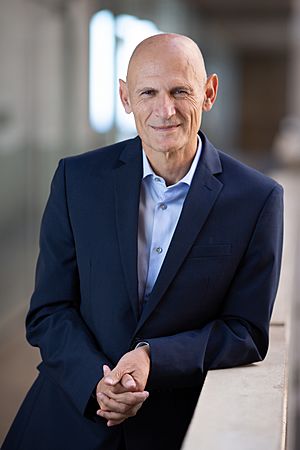Juan Carlos Izpisua Belmonte facts for kids
Juan Carlos Izpisua Belmonte was born on December 12, 1960, in Hellín, Albacete, Spain. He is a Spanish scientist who studies biochemistry and how living things develop. Since 1993, he has been a professor at the Salk Institute for Biological Studies in La Jolla, California, USA.
Contents
Education and Early Career
Juan Carlos Izpisua Belmonte studied at the University of Valencia in Spain. He earned a bachelor's degree in Pharmacy and Science. Then, he got a master's degree in pharmacology from the same university.
He continued his studies and received his Ph.D. in Biochemistry and Pharmacology. He earned this degree from both the University of Bologna in Italy and the University of Valencia. After his Ph.D., he worked as a postdoctoral researcher. He worked at places like the European Molecular Biology Laboratory (EMBL) in Germany. He also worked at the University of California, Los Angeles (UCLA) in the USA. In 1993, he joined the Salk Institute.
Working as a Scientist
In 2004, Izpisua Belmonte helped start the Center for Regenerative Medicine in Barcelona. He was the director of this center from 2004 to 2014. This center focuses on helping the body repair itself.
He also works as a specialist at a company called Altos Labs. His work has created a lot of interest. In 2023, one of his talks in Boston was so popular that too many people showed up. The police had to reduce the crowd because it was against safety rules. Some scientists suggest waiting for more research to be published. They want to make sure the excitement matches the proven scientific results.
Amazing Research on Regeneration
Juan Carlos Izpisua Belmonte is a leader in a very exciting field called regenerative medicine. This area of science tries to find ways to help our bodies heal and repair themselves. His research aims to discover new ways to prevent and cure diseases. This includes diseases that affect people of all ages.
His work also focuses on making our bodies regenerate, or grow back, tissues and organs. This could help people live healthier lives for longer. It might even help us understand and slow down the process of aging.
Here are some of his important discoveries and methods:
- He has helped us understand how a single cell grows into a complex organism. This happens after an embryo is formed.
- He made big steps in understanding how to "reprogram" adult cells. This means turning them back into a younger, more flexible state.
- He developed new ways to turn human stem cells into different types of cells. These can form mini-organs, like tiny kidneys or hearts.
- He created new models using stem cells to study human aging. He also found new ways to make cells "younger" again.
- He developed new genetic methods to treat and prevent diseases. These diseases are caused by problems in our DNA.
- He showed that special reprogrammed cells can be used to create healthy cells for patients. This could be a future cell therapy.
- He developed ways to grow embryos in the lab, including those of non-human primates. He also created synthetic, or artificial, mammal embryos.
- He developed methods to grow human cells inside embryos of different animal species. This research might one day help grow human tissues and organs for transplants.
Awards and Recognition
A secondary school in his hometown of Hellín, Albacete, Spain was named after him. It is called Instituto Enseñanza Secundaria (IES) Izpisua Belmonte. In October 2018, Time Magazine named him one of the 50 Most Influential People in Healthcare.
His work was twice chosen by the journal Science as a "Breakthrough of the Year." This happened in 2008 for his work on cell reprogramming. It happened again in 2013 for creating mini-organs.
See also
 In Spanish: Juan Carlos Izpisúa para niños
In Spanish: Juan Carlos Izpisúa para niños
- Chimera (genetics)
- Gene therapy
- Genome editing
- Regeneration
- Xenotransplantation
Images for kids



